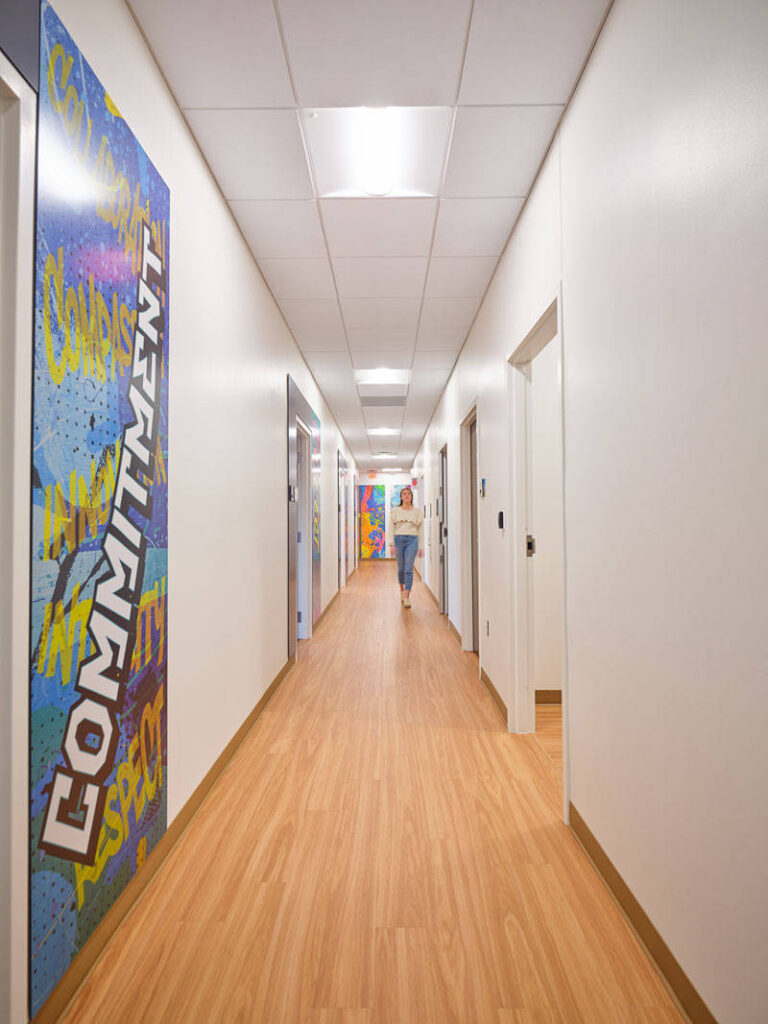Residential Inpatient Mental Health Treatment Center for Teens and Adolescents in Dallas, Texas
Teen residential treatment centers offer a vital service for adolescents in crisis with severe symptoms and are at risk of hurting themselves or others. Although inpatient treatment is not provided at BasePoint Academy, we offer a multitude of highly structured and effective programs that successfully address mental health conditions in the least restrictive environment. Call BasePoint Academy today for more information about mental health treatment for your young adult.
Residential Inpatient Treatment for Teens in Dallas, Texas
Adolescents grappling with mental health obstacles or substance use often experience isolation, a sense of helplessness, or a lack of understanding regarding their emotions. While Residential Inpatient Treatment Centers for teens in Dallas provides the tools to embrace the present and engage in purposeful actions, not every situation requires this level of care.
Serving Arlington, Forney, and McKinney, Basepoint Academy’s Texas-based outpatient programs offers comprehensive mental health care, empowering adolescents to seamlessly integrate their treatment into their daily lives.Whether contending with anxiety disorders, emotional distress, depression, or persistent pain, our dedicated facility provides a safe and nurturing environment, combining expert therapeutic care with a focus on individualized treatment plans to support teens on their journey to mental wellness. As a testament to our dedication, we provide complimentary mental health assessment for teenagers. Upholding inclusivity, we gladly accept insurance coverage for our mental health treatment programs, ensuring that high-quality care is accessible to all.
What Is a Residential Treatment Program?
Residential treatment programs that address mental health conditions offer intensive help for youth who require crisis stabilization or have serious emotional and behavioral issues. Although the terms are sometimes used interchangeably, inpatient and residential technically refer to two different types of care. There are differences in the environment and the level of care between inpatient and residential treatment.
Difference Between Inpatient and Residential Care for Teenagers
Understanding your child’s mental health treatment options is crucial in their journey towards recovery. Both inpatient and residential treatment provide robust support, but they cater to different needs. Inpatient treatment, typically provided in a hospital setting, offers short-term, intensive care. This approach is designed for adolescents facing severe mental health challenges that require constant medical supervision. It’s an immediate response to a crisis, providing a structured environment that prioritizes safety and stabilization.
On the other hand, residential treatment refers to long-term care in a rehab facility setting. Here, teenagers experience a nurturing, home-like environment where they can focus on their recovery over a longer period. This comprehensive approach promotes personal growth, resilience, and the development of essential social skills. However, if your teen wishes to continue attending school while receiving treatment, Intensive Outpatient Programs (IOP) or Partial Hospitalization Programs (PHP) might be more suitable. These flexible programs offer therapy and support while allowing for regular daily activities. Regardless of the chosen path, the goal is to empower adolescents with individualized, evidence-based care that meets their unique needs.
What is Teen Inpatient Psychiatric Treatment?
Inpatient psychiatric treatment for teenagers, such as those provided by adolescent inpatient psychiatric hospitals near me or treatment facilities in your location, offers comprehensive, around-the-clock support for young people grappling with various psychiatric disorders. This type of care not only addresses the immediate crisis but also equips them with coping mechanisms to navigate their daily lives.
One prominent location offering these services is Dallas, Texas, known for its quality inpatient psychiatric care. Some inpatient psychiatric care facilities in Dallas and psychiatric residential treatment centers for youth in Texas provide evidence-based therapy tailored to the unique needs of the adolescents. Moreover, regions like Arlington, Forney and McKinney, TX, are also emerging as hubs for inpatient psychiatric treatment. Regardless of whether it’s a teen psychiatric residential treatment in Texas or a young adult psychiatric inpatient treatment, these facilities strive to deliver quality care, focusing on holistic growth and recovery. The ultimate goal is to empower our youth, ensuring they have access to the care they need to lead fulfilling lives.


Do Teen Mental Health Treatment Facilities Offer Residential Treatment?
Not all mental health treatment facilities that specialize in adolescent care offer residential treatment. When your adolescent is experiencing a mental health condition, they are best treated by licensed mental health professionals who have the education, experience, and training to address adolescent psychology.
Teenagers are not just small adults. During adolescence, hormonal imbalances and brain growth affect adolescent behavior and the way in which your teenager processes information. Mental health facilities that specialize in adolescent psychology address your teenagers needs in a way that increases the potential for success.
Residential treatment centers often require 60 to 90 days or more of treatment, which usually means your teenager cannot continue their school program. BasePoint Academy offers a tailored alternative so your teenager can continue their education and receive educational support within their mental health treatment program.
What Happens if My Child Needs Inpatient or Residential Care?
If, after our complimentary and confidential assessment, Basepoint Academy recommends inpatient or residential care for your child, we will not leave you to navigate the process alone. Our team is committed to supporting families through each stage of your journey, including the transition to and from residential care. We will use our experience and resources to help you find a suitable residential program that aligns with your teen’s needs.
During your child’s time in the residential program, the BPA team will maintain regular contact to monitor progress and provide consistent support. We understand the importance of continuity in these challenging times, ensuring that your child’s development and wellbeing remain the central focus. Once it’s time for your child to transition from the inpatient or residential care back to Basepoint Academy’s programs, BPA will assist with the step down process. This ensures a smooth transition, minimizing disruption and stress for your child, while setting them up for success as they reintegrate into the BPA environment.
Teen Mental Health Admissions and Intake
Our complimentary assessment with a licensed clinician will provide you with a recommendation for the appropriate level of care for your teen struggling with mental health. We can also check your insurance coverage levels.
Call us today to schedule a complimentary same-day assessment at (972) 357-1749 or complete our inquiry form.
Mental Health Admissions form
What is Treated at a Teen Mental Health Residential Treatment Facility?
There are a variety of mental health conditions that are potentially treated within a residential treatment facility. These same diagnoses are also addressed in the highly structured and effective outpatient treatment programs at BasePoint Academy. This is a list of examples and not a full list of mental health conditions that are treated. For more information call BasePoint Academy at (972) 357-1749
Inpatient Treatment for Depression
Depression is a serious mental health illness. If it is left untreated, it gets worse and can have devastating consequences. Inpatient or residential treatment for depression begins with a physical examination to rule out underlying medical conditions that may be linked to mental health.
Teenagers also undergo psychological evaluation that is the foundation of the treatment plan. Residential treatment facilities use a variety of treatments to address depression. Teenagers at BasePoint Academy engage in individual, family, and group therapy under the care of a licensed mental health professional who utilizes evidence-based and holistic approaches to treatment.
Inpatient Treatment for Anxiety Disorders
At some time, everyone experiences anxiety. However, teenagers with anxiety disorders have overwhelming feelings of fear and anxiousness. Inpatient rehabilitation programs may use medical management for anxiety alongside support groups and clinical treatment services. A residential treatment center for teens should be staffed with licensed mental health professionals who have education and training in treating anxiety in adolescents.
Inpatient Treatment for Attention Deficit Hyperactivity Disorder (ADHD)
Attention deficit hyperactivity disorder (ADHD) is a neurodevelopmental condition that often appears first in childhood. The primary goal of mental health treatment for ADHD is to minimize the impact of symptoms while allowing the teenager to maximize their ability and productivity. Residential programs may use a variety of pharmacological and non-pharmacological treatments alongside alternative treatments to help teenagers cope with the symptoms of ADHD
Inpatient Treatment for Bipolar Disorder
Bipolar disorder was once called manic depression. It is a mental health condition in which your teenager experiences extreme mood swings that include emotional highs and lows. The exact cause of the disorder has not been identified. Inpatient treatment for bipolar disorder can include medication management and behavioral therapies to help reduce symptoms and help adolescents cope with stress.
Inpatient Treatment for Post-Traumatic Stress Disorder (PTSD)
Post-traumatic stress disorder (PTSD) is a mental health condition triggered by witnessing or experiencing a traumatic event. The trauma can be acute, such as witnessing a car accident or a sexual assault, or it can be chronic, such as long-term child abuse.
Symptoms of PTSD are highly disruptive and reduce your teenager’s ability to function within society. Residential care programs use a variety of PTSD treatment options, including psychiatric medications, counseling, and behavioral therapy.
Inpatient Treatment for Borderline Personality Disorder (BPD)
Teenagers with borderline personality disorder (BPD) experience emotional instability, insecurity, impulsivity, and have a pattern of unstable and intense relationships as well as extreme emotions. Inpatient therapy centers may include cognitive behavioral therapy, motivational interviewing, and dialectical behavioral therapy. BPD may be a co-occurring mental health condition alongside substance use disorders and addiction.
Alternatives to Residential Inpatient Programs
If your teenager does not require inpatient or residential treatment for mental health or substance use disorders, there are alternatives that can help meet their treatment needs. The following list are examples of the types of alternatives you can consider, but it is only a partial list. For more information about how BasePoint Academy may meet your family’s needs, call us today at (972) 357-1749
Outpatient Treatment for Teenagers
Outpatient treatment for teenagers offers the opportunity for adolescents to receive psychiatric treatment for generalized anxiety disorder, social anxiety, clinical depression, and a variety of other mental health conditions on an outpatient basis. These programs typically involve individual therapy and may include family therapy as well.
Day Programs or Partial Hospitalization Programs (PHP)
Partial hospitalization programs, or day treatment, for teens are also sometimes called day programs. The programs run five days per week throughout the day, during which teenagers are involved in multiple behavioral therapy and counseling sessions including support groups, group therapy, and family therapy.
At BasePoint Academy, teenagers also receive education counseling to help work with their requirements to ensure academic success, and transportation as needed to help adolescents get to and from their partial hospitalization treatment sessions.
Teen Intensive Outpatient Programs (IOP)
An intensive outpatient program for teenagers operates several days a week for several hours each day. The right program can make a significant difference in your teenager’s future. BasePoint Academy is here to help teenagers and Texas families who are struggling with mental health conditions and substance use disorders.
The program offers your teenager what they need in the least restrictive environment so they can learn new skills at BasePoint Academy and return home at night to practice them.
Mental Health Therapy for Teens
Mental health therapy typically includes talk therapy and counseling to help address the needs of teenagers who experience anxiety symptoms or clinical depression, also called major depressive disorder. Examples of mental health therapy include cognitive behavioral therapy, dialectical behavioral therapy, and experiential therapy for teens.
BasePoint Academy also offers a resiliency program for teens to help reduce the potential for relapse and teach adolescents strategies that improve their mental health resilience. These therapy programs are administered within individual therapy sessions, family therapy, group therapy, and support groups.
Religious and Faith-Based Treatment Programs
Religious and faith-based treatment programs offer many of the same evidence-based and holistic approaches to mental health treatment, but through the lens of the religion or faith on which the treatment center is based. For example, Christian faith-based treatment programs help teenagers with symptoms of their mental health condition and utilize the support and strength of Christian principles.
Does Insurance Cover Mental Health Residential Programs?
Yes, health insurance covers mental health residential programs for teenagers in Dallas, Texas. All health insurance companies must offer plans that cover essential health services. These services are defined by the Department of Health and Human Services to include mental health conditions and substance use disorders. This was mandated by the 2010 Affordable Care Act.
However, not all health insurance policies have the same benefits, and the limitations also vary. For example, your health insurance policy may cover a residential program but not a partial hospitalization program, or your policy may limit the number of sessions or the type of therapy your teenager can receive. Most health insurance policies have a customer service number where you can get information you need about the benefits and limitations on your policy.
The easiest way to understand what is and is not covered in your policy is to call BasePoint Academy at (972) 357-1749. Our admission specialist can verify your insurance coverage, determine if prior authorization is required for treatment, and help estimate your out-of-pocket costs.
BasePoint Academy Accepts health Insurance
We accept most major health insurance providers in Texas and can check your treatment coverage levels on your behalf
Residential Treatment Center Alternatives for Teens in Dallas, Texas
While residential treatment for teenagers in Dallas, Texas, can be vital for crisis stabilization, lower levels of care can often be a better fit for adolescent mental health treatment. Once your teenager is no longer a danger to themselves or others, BasePoint Academy offers an alternative to residential treatment in multiple facilities in and near Dallas, Texas.
- Arlington, Texas: 3900 Arlington Highlands Blvd, Suite 237, Arlington, TX 76018
- Forney, Texas: 713 W Broad St, Suite 200, Forney, TX 75126
- Frisco, Texas: 8275 Judges Way, Suite 100I, Frisco, TX 75036
- McKinney, Texas: 4733 Medical Center Drive, McKinney, TX 75069

Treatment Center in Arlington, Texas
Arlington, Texas, is just 10 minutes from the Dallas-Fort Worth International Airport and is home to the MLB Texas Rangers, the International Bowling Museum Hall of Fame, and AT&T Stadium. The city was founded in 1876 and is located on roughly 100 square miles with a population of just over 390,000 people. Within Arlington there are 4,600 acres of parkland, 85 miles of park trails, and multiple areas for recreational activity including softball, golf, basketball, tennis, and swimming.
- BasePoint Academy – Arlington, Texas: 3900 Arlington Highlands Blvd, Suite 237, Arlington, TX 76018, United States
Treatment Center in Forney, Texas
Forney, Texas, is located in Kaufman County, just 20 miles east of Dallas. In 2000, the population was 5,588 but it has since grown to 23,455 in 2020. The first settlers in the town didn’t arrive until roughly 1846. Today, Forney is most widely known for its antique trade and as one of the most affordable suburbs in the Dallas-Fort Worth area. The historic downtown area still has well-preserved buildings that date back to the 19th century and the city supports 11 community parks, many of which contain a variety of amenities.
- BasePoint Academy – Forney, Texas: 713 W Broad St, Suite 200, Forney, TX 75126, United States
Treatment Center in McKinney, Texas
McKinney, Texas, is just 30 minutes north of Dallas, and is a rapidly growing community. The town offers a historic downtown area with shopping, entertaining and dining. There are more than 120 shops, galleries, and stores in downtown McKinney. Within McKinney is the Heard Natural Science Museum and Wildlife Sanctuary that sits on 289 Acres.
- BasePoint Academy – McKinney, Texas: 4733 Medical Center Drive, McKinney, TX 75069, United States
Contact BasePoint Academy Today
Contact us today to schedule a free confidential assessment for your teen with a licensed clinician.
You can also get in touch to talk with our mental health experts about treatment needs, care options and your insurance coverage levels.
Call: (972) 357-1749Check Your InsuranceWhich Insurance Providers Cover Mental Health for Teens in Dallas, Texas?
Nearly all the large insurance providers that offer coverage in Dallas, Texas, offer some level of mental health treatment coverage. Some of those insurance providers include Aetna, Cigna, Carelon Behavioral Health, Blue Cross Blue Shield, and United Healthcare. Each insurance plan writes policies to meet the needs of their beneficiaries.
In addition to the protection offered by the Affordable Care Act, the Mental Health Parity and Addiction Equity Act of 2008 prevents group health insurance plans from imposing limitations on benefits that cover substance use disorder or mental health condition treatments that are less than those offered for traditional medical or surgical benefits.

How Much Does Inpatient Residential Treatment for Teenagers Cost Without Insurance?
The cost of inpatient residential treatment without insurance varies widely. Traditionally, the cost considered is your out-of-pocket cost. This is influenced by the cost of the residential program and the amount of financial aid that you can receive. Inpatient and residential treatment program costs vary depending on several factors.
These factors include geographical location, intensity of the therapy program, and whether the treatment center is public or private. For example, the cost of adult residential treatment in 2016 ranged from roughly $3,000 to $11,000. There are several options to assist with treatment costs, including local scholarship programs for inpatient care, sliding scale fees, community based groups, and subsidized coverage from federally-funded or partially-funded insurance programs.
How To Get Your Teen Into Treatment If You Have No Insurance
Securing mental health treatment for your teenager can feel daunting, especially if you’re navigating the process without insurance. However, options are available. Inpatient mental health facilities near you may offer resources to help those without insurance. Some facilities may have sliding fee-scale payments, making treatment more affordable based on your income.
While inpatient treatment provides intensive care, there are other cost-effective alternatives. Intensive Outpatient Programs (IOP) and Partial Hospitalization Programs (PHP) can offer flexible, comprehensive mental health care at a lower cost. These programs provide therapy and support while allowing your teen to continue with their daily activities. They’re an excellent option for families seeking ongoing support without the need for round-the-clock supervision. Remember, the goal is to ensure your teen receives the care they need, and there are multiple pathways to achieving this.
Contact BasePoint Academy Today
Contact us today to schedule a free confidential assessment for your teen with a licensed clinician.
You can also get in touch to talk with our mental health experts about treatment needs, care options and your insurance coverage levels.
Call: (972) 357-1749Check Your InsuranceWhat Happens at a Residential Treatment Facility?
During treatment at a residential facility, the individual lives on site and can receive around the clock care. The routine is highly structured, including when teenagers wake up and go to bed. Many residential care facilities also have rules about digital technology use during treatment or who may or may not visit.
Residential treatment centers typically provide 24-hour supervision and monitoring. This is essential during substance use detoxification, but it also provides an intensive therapeutic environment for those who struggle with a mental health condition. Therapeutic interventions can include behavioral therapy to treat panic attacks, mood disorders, depression, and anxiety symptoms.
Long-Term Inpatient Treatment for Teens
A long-term residential treatment facility in Dallas provides a secure, nurturing environment for teenagers and adolescents grappling with emotional, behavioral, and mental health issues. These facilities offer an immersive treatment experience, where the focus is not only on addressing the immediate crisis but also on fostering personal growth and resilience. Teens receive 24/7 professional care, participate in intensive therapy, and engage in group activities that promote social skills and self-awareness. The duration of these programs typically extends to six months or longer, offering a comprehensive approach to mental health care.
While long-term residential treatment facilities offer intensive care, there are other effective alternatives available as well. Intensive Outpatient Programs (IOP) and Partial Hospitalization Programs (PHP) provide a more flexible approach to mental health treatment. These programs offer therapy and support while allowing teens to continue with their regular activities, such as school. They can be especially beneficial for those who require ongoing support but don’t need round-the-clock supervision. Regardless of the path chosen, the goal remains the same – to empower our youth to lead healthy, fulfilling lives.


What is the Mental Health Residential Treatment Admissions Process?
There are several steps to admission at a residential treatment program. While the admission process can vary between programs or facilities, the goal is to ensure that your teenager receives the best possible care. The admission process begins with your initial contact to the treatment center.
During your first phone call, a residential center may offer a free assessment and evaluation. This helps to determine if their program can meet the needs of your teenager. Next, the center will verify your insurance coverage. If you, your teenager, and the treatment center agree that your teenager’s needs can be met, your adolescent will have a more thorough medical and psychological evaluation, which is the foundation of an individualized treatment plan.
Admission into a residential program is coordinated with the center to ensure that costs are covered, your teenager brings only what’s allowed into the center, and you and your teenager have a thorough understanding of the expectations. During treatment, it’s expected that your teenager will actively participate, and that the treatment staff will routinely monitor their progress and make adjustments to their treatment program.

Statistics on Teen Residential Treatment in Texas
Roughly 22.8% of all U.S. adults experienced some mental illness in 2021 and 16.5% of young people aged 6 to 17 experienced a mental disorder in 2016. The most diagnosed mental health condition in adults was anxiety disorders that affected 19.1% of adults, followed by 8.3% of adults who experienced major depressive disorder.
In those who were diagnosed, women were more likely to report a mental health condition than men. Several reports have noted a high utilization of inpatient or residential mental health treatment or a shortage of inpatient psychiatric beds, with a low rate of follow up after hospitalization.
Adolescent Inpatient Mental Health Facilities in Dallas, TX
In the heart of Dallas, a city known for its vibrant culture and thriving community, lies a network of specialized mental health facilities, offering comprehensive inpatient psychiatric care. These adolescent inpatient mental health facilities in Dallas not only address immediate mental health crises but also focus on long-term healing and recovery. Their professional, dedicated teams are committed to providing unparalleled care, ensuring that each patient receives personalized treatment tailored to their unique needs.
Popular Guides on Treatment, Counseling and Therapy Programs
Popular Guides on Behavioral Health and Mental Health Disorder
Statistics on Residential Program in Texas
- According to the National Alliance on Mental Health, 22.8% of all U.S. adults experienced some mental illness in 2021 and 16.5% of youth aged 6 to 17 experienced a mental disorder in 2016.
- In adults, the highest prevalence of mental illness was anxiety disorders that affected 19.1% of people, followed by major depressive disorder that affected 8.3%. Women are more likely to report a mental illness than men.
- Of those with mental illness, 47.2% received treatment in 2021 and 50.6% of youth received treatment in 2016.
- In 2022, the American Psychiatric Association announced a shortage of inpatient psychiatric beds across the U.S., which may be alleviated when communities explore other effective means for psychiatric treatment.
- In a report from the Office of the Assistant Secretary for Planning and Evaluation, the writers found a “very high” utilization rate for inpatient and residential mental health treatment with a low rate of follow up.
Learn More About Residential Treatment for Teens Today
If your teen has been exhibiting mental health issues, substance abuse, or other behavioral health concerns, it’s time to explore effective and focused treatment options. The team of clinicians, counselors, and therapists at BasePoint Academy provide an integrative approach to teen treatment that supports lifelong success. Call today to schedule a complimentary assessment.
Contact BasePoint Academy Today
Contact us today to schedule a free confidential assessment for your teen with a licensed clinician.
You can also get in touch to talk with our mental health experts about treatment needs, care options and your insurance coverage levels.
Call: (972) 357-1749Check Your Insurance





